Children
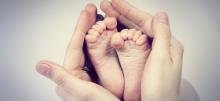
In a classic 1960 children's book, a baby bird toddles up to one critter after another asking, "Are you my mother?"
For some babies today, there's no simple answer — biologically or legally.
Advances in artificial reproductive technologies mean a baby could have three "mothers" — the genetic mother, the birth mother and the intended parent, who may be a woman or a man.
Statutes on surrogacy, adoption, divorce and inheritance vary state by state, court by court, decision by decision. For nontraditional couples, the patchwork of laws makes it even more complex. New York allows gay marriage but forbids surrogacy, for example, while Utah permits surrogacy but bans gay marriage.

One of the great debates around Christmastime for Christians is whether to encourage or allow the belief in Santa Claus. I have friends and family on both sides of this debate, so I want to be careful here. I have a great deal of respect for the desire to keep the focus on Jesus and his birth at this time of year. I want to encourage that focus, too.
And, yet, I allow my children … I encourage them even … to believe in Santa.
We — my husband and I — don’t just stop there. We also have elves that visit our house every year during this season. Some would say that at best I am distracting from the message of Christ. At worst I am lying to my children.
The line between fantasy and falsehood is delightfully fuzzy during childhood. God created it to be this way and it is so important for a child to be able to play in this grey area.

We were walking up the beach, on the sand as the tide moved out toward the ocean. I was holding Zeke's hand, talking with him about sea things. "I didn't know jellyfish swam this close to the shore during the spring," he said in 5-year-old wonderment. "I bet that drift wood is as old as The Old Man and the Sea. I think a horseshoe crab's blood can be used to treat cancer."
"Look," I said.
"What is it, Dad?" he asked.
I picked up a shell out of the deep, hot sand and held it in my open hand.
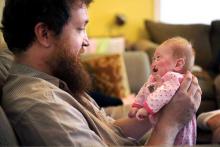
NASHVILLE, Tenn. -- Eric and Ruth Brown believe nothing about daughter Pearl Joy's life is a mistake.
They say God gave Pearl her bright red hair and wide blue eyes, as well as the genetic disorder that created a cleft in her upper lip and caused her brain's development to stall in the first weeks in the womb.
"Things didn't go wrong," Eric Brown said. "God has designed Pearl the way he wanted, for his glory and our good."
That belief has sustained the Browns during the past six months, ever since a routine ultrasound revealed that the couple's third child has alobar holoprosencephaly, a rare genetic condition that's almost always fatal. A specialist told the Browns she would probably die in the womb and advised them to end the pregnancy early.
It's one thing to talk about God's will when life is good. It's another when a doctor is saying your baby won't live.
The Browns were forced to consider religious, medical and ethical issues most parents never will. And nobody could make their decision for them.
The Browns never considered abortion. They believe that Pearl is "fearfully and wonderfully made," as Psalm 139 puts it, and God alone should decide when she lives and when she dies.
Seeing Pearl's beating heart on the ultrasound also persuaded them to continue the pregnancy, even if the odds were stacked against her.
"If there is a chance, you say yes to that chance," Eric Brown said. "The only thing I know about parenting is that you say yes."
So far, Pearl has beaten the odds.
Few babies with Pearl's disorder make it to term, and of those who do, only 3 percent survive birth, according to the Dallas-based Carter Centers for Brain Research in Holoprosencephaly and Related Malformations. Pearl has a particularly severe form of the condition, which means her brain never divided into two hemispheres.
She turned 11 weeks old Oct. 12, a milestone that the Browns celebrated by lighting 11 candles and singing "Happy Birthday."

#5. Delivery complications: Amy was a real trooper when Mattias was born, but nothing about it was easy. Actually he and I had eerily similar experiences making our way into the world. We both were exactly the same length and weight, we both were faced the wrong way, and both of us were finally delivered by caesarian section, after putting our moms through hours of hardcore labor.
The story I’ve heard is that my delivery was a big part of why my folks decided not to have any more children. Before that, they planned on having more but it was too much to deal with. And let me tell you that I can sympathize. I was in the room both when Amy tried to deliver naturally, and when they cut her wide open and yanked the little peanut out. His face was blue from a lack of oxygen, and his umbilical cord wrapped twice around his neck. Though I’ve never experienced such awe and joy in my life, I also have no desire to relive that sort of terrifying vulnerability.
#4. Postpartum: We didn’t recognize it as such for almost a year, but Amy suffered from pretty severe postpartum depression after Mattias was born. In a phrase, it sucked. I also happened to be running for local political office at the time, which added stress to the situation, but I didn’t know what the hell was going on. It was our first time, after all, and no one really warned us about what to do if your wife has quasi-psychotic images of herself pushing your baby down the stairs. She was so worried she was going crazy that she didn’t tell anyone for fear that they might take Mattias away from her. So instead, she tried to manage it, quite unsuccessfully, on her own for nearly 12 months.
The breaking point finally came one night when we were lying in bed and I laid it all out. I knew something was really wrong, but I had no idea what it was. I could feel her withdrawing farther away from me every day, and I felt like I couldn’t do anything about it.

 Don’t ever kill me, OK? Killing me is not safe.
Don’t ever kill me, OK? Killing me is not safe.
—Mattias, 3 years, 0 months
“What’s your greatest fear about having another baby?”
I don’t think Amy was just goading me when she asked me this back in the early stages of impending double fatherhood, but she knows we’re both pretty good worriers (though I’d argue she’s better at it than I am, and since I’m the one writing this book, we’ll assume she’d agree with me).
Talk about an open invitation to worry! I don’t spend a lot of energy worrying about day-to-day matters; I’m more of a saver. But when something comes along that’s really worth worrying about, you can bet I’ll draw down that worry account a bit.
After Amy asked me the fateful question, I started compiling a mental list. I figure I’ll lay out at least my top ten here for your edification, or at least for simple amusement:
#10. We could have twins...
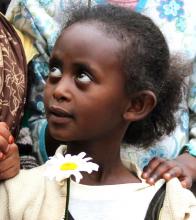
BAHIR DAR, Ethiopia — When I posted this photograph of a beautiful little Ethiopian girl holding a daisy a few days ago, my friend and fellow God's Politics blogger Christian Piatt responded on Twitter with a four-word comment:
"The Face of God."
Christian's remark stopped me in my tracks ... because it's absolutely true.
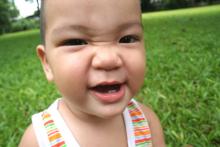
A couple days ago I called my friend Kae so we could talk about this Gospel reading where Jesus takes a child in his arms and teaches the disciples that if they welcome a child in his name they welcome God. And we started talking about the actual reality of children and how difficult small ones can be to manage. Kae told me of this brilliant technique she employs when dealing with toddlers.
She said it really helps her to be patient and compassionate with defiant, emotional, snot-faced toddlers when she just thinks of them like little versions of really drunk friends. Then when they keep falling down and bumping into things and bursting into tears she just treats them like she would a friend who is too drunk to know what they are doing, and who you just try and make sure doesn’t hurt themselves, and who you clean up bodily fluids from, and make sure they drink some water, and then just lovingly change them into their pajamas and tuck them into bed.
Children are really a mess.

I try to teach in the present. With Billy, though, I found myself thinking about the future. Will middle school be a challenge for him? Will he be an outcast in high school? Or a target for bullies?
I wondered what contributions he might make to society as an adult. Would he start a revolution in the art world?
If his peers constantly slap their hands down and say there's no room for him, how will he react? Will he become a part of what author Alexandra Robbins calls the "cafeteria fringe,” those people who are not a part of the school's or society's in-crowd? Because he seems different, will he be labeled “geek,” “nerd” or “weirdo?”
As a teacher I want to help him overcome. But what can I do?
Ask a random group of people, “How do we improve our public schools?” and you’re apt to get divergent, passionate answers. Christians, like other citizens, have different opinions on how to heal what’s hurting in our education system. What we can share is a belief that all children are truly precious in God’s sight and an understanding that public education is a key component of the common good—that a healthy school system has the potential to bring opportunity and uplift to children regardless of their economic status.
Jan Resseger is the minister for public education and witness with the national Justice and Witness Ministries of the United Church of Christ. She spoke with Sojourners associate editor Julie Polter in June.
Sojourners: Why is public education a commitment for the United Church of Christ?
Jan Resseger: The commitment to education is a long tradition for us. Our pilgrim forebears brought community schooling and higher education to the New England colonies—New England congregationalism is one of our denominational roots. Another root is the American Missionary Association (AMA), an abolitionist society that grew out of the defense committee for the Africans on the slave ship Amistad. The AMA founded schools for freed slaves as a path to citizenship across the South during and after the Civil War.
Several denominations came together as the UCC in 1957, and our general synods since then have taken stands on issues such as the protection of the First Amendment in public schools and supporting school desegregation through the ’60s, ’70s, and ’80s. From 1958 to the present, we have spoken to institutional and structural racism and classism in schools. We also have addressed privatization, because we’ve been strong supporters for many, many years of public schools as key to the strength of our society and democracy.

My sons, ages 13 and 10, spend two evenings each week on a golf course because I parent out of my own personal brokenness, which includes an acute awareness of life experiences and skills I was not exposed to growing up.
Tennis lessons. Skiing lessons. Swimming lessons. Golf lessons.
Check. Check. Check. Check.
(My daughter got the first three. She escaped golf because she has immersed herself into the world of dance for the past few years though it’s not completely out of the picture yet.)
One of my goals has been to expose my children to things I didn’t do and at one point or another felt like I had missed out on. This all despite the fact that I also wrestle with my own personal prejudices against sports like tennis and golf because they have in one way or another represented privilege and access to opportunities and networks my parents and I did not have.
So it did not surprise me to see a very diverse group of participants on our first day at the course – diverse meaning White or Caucasian children were in the minority. Golf, whether you are in business or in medicine, more if you are male but increasingly so if you are female, is one of those “life skills” that also translates into opportunities and networks that non-White communities continue to learn about and enter into.
Jonathan Kozol, author of Fire in the Ashes, talks about the gripping stories of poor children, the problems of “obsessive testing,” and how to build a school system worthy of a real democracy. An interview by Elaina Ramsey.

I love to receive letters. When I was a little boy, I lived on a long, straight street and I could see the mail truck coming from a long way off. After the mailman stopped in front of our house, I ran with hope in my heart down our front walkway, between our two giant maple trees and across the street to our mailbox. Would there be a letter for me? Was someone in the world thinking of me?
One day last year it was not the mailman, but a second-grader on the school playground, who handed a letter to me. I unfolded it.
"Dear Mr. Barton, hi it Odeth from 2th grade I miss you a lot I wanted to know about you so much I am being good I am in 4th grade Do you miss me. I live in __________ I go to school in __________ I hope you will come to my school … can you come visit me in school ask for my name…I am 10 year old I want you to come to my school.
Your best student,
Odeth"
What a wonderful thing, to be remembered by a student.

Imani walked down the hall with a paper cup in her hands.
She stopped and held up the cup to me. Inside of its paper walls were soil, water, and seeds — all those humble and elemental things that build a third-grader's scientific knowledge.
Imani was growing cabbage.
She was my student last year. She loved science and writing. I remember the look of wonder in her eyes when we studied weather. We learned about tornadoes. In my classroom, I had two 2-liter bottles connected by a tornado tube, a plastic piece that allows you to make a tornado by swirling the water around and around in one of the bottles. Imani held the bottles in her hands and marveled as her water formed into a giant, powerful funnel cloud.
"Wow," she whispered.
I love the sound of learning.
USA Today reports on a new study by the Annie E. Casey Foundation, called Kids Count:
The well-being of American children looks to be a mixed bag, with gains in academic achievement and health offset by growing economic distress, a new study finds.
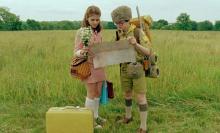
I liked this film so much I've already seen it twice. Moonrise Kingdom is so good, in fact, I almost couldn't bring myself to write about it for fear of not doing it justice.
And yet, since I first took my 11-year-old nephew, Ethan, to see it last month, I've been talking about Moonrise Kingdom nonstop, encouraging everyone I know to go see it. It has captured my imagination completely, an absolute tour de force — wholly original and an "instant classic," as I heard one film critic utter tell a companion on his way out of the theater.
Perhaps Ethan, a mythology buff who's never met a fantasy film he didn't like, put it most eloquently when he said (surprising no one more than himself), "That was the best film I've ever seen."
Moonrise Kingdom is director Wes Anderson's seventh feature-length film to date. In an iconoclastic cinematic oeuvre unrivaled among filmmakers of his generation, Anderson's latest stands above the rest of his stellar films — Bottle Rocket, Rushmore, The Royal Tennenbaums, The Life Aquatic with Steve Zissou, Fantastic Mr. Fox and Darjeeling Limited — as an eloquent, funny, enduringly poignant homage to childhood and, moreover, to innocence.
In a word, the film is perfect. I wouldn't change a thing.

Love, we read over and over in the Bible, casts out fear.
The angels to Mary: Do not be afraid. To the shepherds: Do not be afraid. Do a search on that phrase and you’ll find it numerous times from 2 Kings through Revelation. When he appears to humans, our God of love is always prefacing his messages with, “Do not be afraid.”
As a mother, I want to raise brave kids who hear that message and know it to their toes. Everything is going to be all right. Love wins, as they say.
I want them to be people who know that there is a bigger picture, a spiritual promise of hope and redemptive, even when life circumstances feel frightening.
I don’t want them to lose sight of it or fail to see God’s gifts of love around them because they are afraid of what, ultimately, cannot harm them.
It’s not always easy, however, for me to be brave.
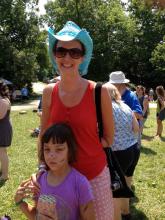
The 2012 Wild Goose Festival East wrapped up just under a week ago and I am still trying to process my experience there. As I tweeted as I drove away from the fest, I left feeling exhausted, hopeful, and blessed – that strange combination that reflected the emotional impact of my time there. And it was a truly blessed time.
I was honored with the opportunity to speak on The Hunger Games and the Gospel as well as do a Q&A on everyday justice issues at the Likewise tent. I also was able to join Brett Webb-Mitchell on a panel discussion about living with disabilities in religious communities.
But beyond those conversations I was able to help initiate, I also found a generous and safe space to connect with friends, wrestle with difficult questions, and dream of a better world. Such spaces are so rare in my life these days, that finding such at Wild Goose was a precious gift.
There are, of course, the expected complaints about the festival. It was brutally hot (and that is coming from a Texan). I never ceased to be sticky, sweaty, and stinky and there were bugs everywhere. Camping in a field where every action (and parenting attempt) is on constant display is stressful and uncomfortable. And, as with many religious gatherings, there could have been greater diversity.
For the first hour I was there as I nearly passed out trying to set up a tent in the sweltering heat, I was in a panic mode wondering why I was stupid enough to subject myself to the discomfort and imperfection of it all again this year. Yet as I entered into the experience of being a part of this crazy wonderful gathering, those issues (although ever-present) faded in significance as I found myself fitting into a place where I felt I belonged.
“TAMARA” GREW UP in an affluent, middle-to-upper-class neighborhood. Her friends, including the ones she knew from church, were her cousins, neighbors, and other kids who were a lot like her. Her parents worked hard at building a “safe zone” to protect her from harm—but, as Tamara looks back on her childhood, she can see the lasting fear that it instilled in her.
After she got her driver’s license, she always double-checked that her car doors were locked as soon as she was in the vehicle, and she avoided her city’s small downtown area. To this day, she detests large cities and is constantly worried that someone will rob her. Tamara suffers from “mean world” syndrome: a hyper-vigilant state in which strangers are to be ignored and avoided, new experiences are to be feared, and other people’s problems are just that. It’s a survival mode based on scarcity, hoarding, looking out for number one. Too often, it involves shrinking back from active involvement in the biblical call to social justice.
Sadly, many parents put children in a kind of quarantine—not seeking justice, but fearing contamination. The view that children are pure and the world is corrupt has led well-intentioned adults to (over)protect children from poverty, disease, violence, and other “pollutants.” (Of course, this isn’t to say that all children grow up sheltered; many experience situations of poverty, violence, and oppression that sheltered families can’t even imagine.) Ironically, as children are quarantined from the harmful realities of the world, they’re often exposed to virtual violence through television, music, and video games. This is a recipe for creating kids who, like Tamara, are afraid of the unknown that exists beyond their bubble-wrapped microcosms.
We who nurture the life of children could be compared to gardeners, conscientiously serving the God-given stages of the growing plant. We seek to support its development as a seedling, a young plant, and a fruit-bearing or mature plant.
However, Christian educators of young children often begin to water, weed, and prune without first observing children to grasp the stages of their relationship with God. God has planned human and spiritual growth just as well as God has prepared plant growth.
Catholic scholar Sofia Cavalletti and her collaborators Gianna Gobbi and others around the world and in many denominations have carefully observed the stages of newborn to 12 year-old children’s relationship with God, and they have developed an approach to religious formation, called the Catechesis of the Good Shepherd, that serves those stages well. The encounter with God over the years includes coming to know God who is love, God who is personal, and God who is just and merciful, as these and other aspects of God match the developmental strengths of the growing child.
Here is that development and its implications in very broad strokes:
- Ages 0 to 6. Young children are in a relationship of love with God. This begins with life. This time is one of joy. For the young child, Christianity is not about doing good, but about being in love with Jesus. We serve this period with parables such as the good shepherd, the found sheep, the mustard seed, the pearl of great price, and the leaven, as well as the narratives of the birth of Christ, the Last Supper, and the women at the tomb. The signs of God’s presence through water, bread, and wine are also introduced according to the practice of each congregation.